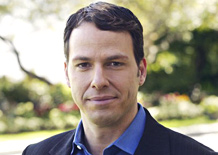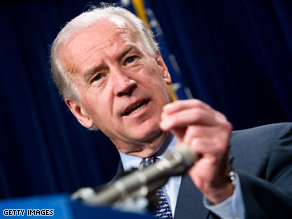WASHINGTON -- Hillary Clinton replaced the longtime chief strategist of her struggling presidential campaign after the disclosure that he was working with Colombia's government to help win congressional approval of a trade pact that she opposes. The move comes two weeks before the pivotal Pennsylvania Democratic primary, where trade issues are likely to play a big role.
In a statement, campaign manager Maggie Williams said that "after the events of the last few days, Mark Penn asked to give up his role as chief strategist." Clinton campaign advisers made clear that he was all but forced out for what Mr. Penn on Friday conceded was "an error in judgment" in helping a client of his private, public-relations firm at the same time he held a top role in the campaign.
![[photo]](http://s.wsj.net/public/resources/images/P1-AL100_PENN_20080406205453.jpg) |
| Former adviser Mark Penn speaks to reporters following a debate. |
The quick ouster of Mr. Penn, despite his long and close ties to both Hillary and Bill Clinton, reflects the potential damage done by his actions at a time when the New York senator is fending off calls within the Democratic Party to concede the presidential-nomination race to Sen. Barack Obama of Illinois.
It's Sen. Clinton's second big staff shake-up this year, following the replacement of her campaign manager two months ago. Mr. Penn's sudden fall came after The Wall Street Journal disclosed Thursday that he had met earlier in the week, in his noncampaign capacity, with the Colombian ambassador to the U.S.
Mr. Penn didn't respond to requests for comment.
With Sen. Obama ahead in convention delegates, popular votes and funds, Sen. Clinton has been hoping for a big win in Pennsylvania's potentially climactic Democratic primary April 22 to make the case that she would be the party's more electable nominee in November. She leads in polls there, though her edge has eroded.
While the Obama campaign so far hasn't publicly exploited Mr. Penn's controversy, and a spokesman again declined to comment last night, the strategist's actions pose a double-barreled threat the Clinton campaign had to address. First, free trade is a controversial issue in the struggling manufacturing state among working-class Pennsylvania Democrats, as it was in Ohio's primary last month.
Moreover, the disclosure that Sen. Clinton's chief strategist is advocating privately for a trade pact she opposes publicly raises questions of the candidate's credibility, a trait where polls already show her weak. Sen. Clinton won last month's Ohio contest by a big margin, in part due to her attacks on Sen. Obama's sincerity in his criticism of free-trade pacts. The Clinton criticisms of her rival were based on reports that his economic adviser had met with Canadian officials and reassured them that Sen. Obama's campaign rhetoric was harsher than his real beliefs about the North American Free Trade Agreement.
Sen. Clinton's spokesman reiterated Sunday that she will vote against the pact. President Bush has signaled that he could send the Colombia trade agreement to Congress this week.
Mr. Penn's polling firm -- Penn, Schoen & Berland Associates -- will continue doing work for the campaign, Ms. Williams said. But pollster Geoff Garin and communications director Howard Wolfson "will coordinate the campaign's strategic message team going forward," according to her statement last night.
Mr. Garin had only joined the Clinton campaign in recent days in what other advisers privately described as a diminution of power for Mr. Penn. Long before the Colombia controversy, Mr. Penn has been blamed by Clinton advisers and supporters for a flawed strategy that has left the New York senator, once seen as the inevitable nominee, instead struggling against Sen. Obama for the Democrats' nomination. He has long been criticized as the architect of a campaign strategy that emphasized Sen. Clinton's Washington experience in an election year when voters say they want change from the capital's ways.
Mr. Penn is chief executive of lobbying and public-relations giant Burson-Marsteller Worldwide, which last year got a $300,000 contract with Colombia to help win Congress's approval of the bilateral trade pact despite Democrats' resistance.
In a statement on Friday, he apologized and described his meeting with the ambassador, Carolina Barco Isakson, as "an error in judgment." That in turn offended the Colombian government, which on Saturday announced it was canceling the contract with Mr. Penn's firm. The embassy's statement said he showed "a lack of respect to Colombians."
Also outraged are the organized-labor groups so influential in the Democratic presidential nomination race. U.S. unions not only oppose the pact with Colombia, but they note as well that country's poor human-rights record against unionists. Two major U.S. union alliances, which have endorsed Sen. Obama, publicly called for Mr. Penn's ouster from the Clinton campaign on Friday.
"How can we trust that a President Hillary Clinton would stand strong against this trade deal when her top adviser is being paid by Colombia to promote it?" asked Teamsters head Jim Hoffa. His union has endorsed Sen. Obama.
From the start of the Clinton campaign 15 months ago, other advisers have complained that Mr. Penn kept the Burson-Marsteller job. It not only held distractions from the campaign, they said, but had the potential for conflicts of interest between the firm's clients and Sen. Clinton's political stands. Previous reports have noted the firm's work for subprime-mortgage lender Countrywide Financial Corp., and for security firm Blackwater, the focus of congressional investigations into private contractors' responsibility for civilian deaths in Iraq. As a candidate, Sen. Clinton has been an outspoken critic of both companies.
For months before the Colombia controversy, many Clinton campaign operatives had sought Mr. Penn's demotion or ouster. He and senior adviser Harold Ickes barely speak, aides say, and Mr. Penn has clashed also with media strategist Mandy Grunwald.
Campaign insiders, as well as many Clinton supporters and donors, had privately hoped for Mr. Penn's departure. After earlier losses in primaries and caucuses, Sen. Clinton replaced her original campaign manager, Patti Solis Doyle, with Ms. Williams, who had been Sen. Clinton's White House chief of staff when she was first lady.

Some Clinton advisers had hoped that Mr. Penn would be pushed out as well at that time. But he was said by the others to have just two allies within the campaign, and they were Hillary and Bill Clinton. Mr. Penn was pollster and strategist for Mr. Clinton's 1996 re-election and for his second term.
But his latest actions with Colombia, in leaving Sen. Clinton vulnerable to the same charges of hypocrisy that her campaign leveled against Sen. Obama in Ohio, apparently undercut that base of support. Sen. Clinton is favored to win in Pennsylvania, but the Colombia trade embarrassment is one that could cost her working-class and union support there.
In Ohio, Sen. Clinton had mocked Sen. Obama for what she called his "wink-wink" approach to Nafta, the 14-year-old trade agreement with Canada and Mexico -- criticizing it on the campaign trail, even as his economic adviser, Austan Goolsbee, had agreed to meet with a Canadian official concerned about future U.S. adherence to the pact. While Bill Clinton cites Nafta as a top achievement of his presidency, both Sen. Clinton and Sen. Obama have said they would seek changes to toughen labor and environmental protections.
Reflecting her sense that the media treats Sen. Obama more kindly than it treats her, Sen. Clinton at one point during the Ohio campaign challenged a large group of reporters in regard to the Goolsbee matter, "I would ask you to look at this story and substitute my name for Sen. Obama's name and see what you would do with this story... Just ask yourself [what you would do] if some of my advisers had been having private meetings with foreign governments."
Aside from recycling that Clinton quote to reporters last Friday, the Obama campaign has not commented on the Penn contacts with Colombia's ambassador. Nor has Sen. Obama addressed it.
Last night, one Clinton adviser recalled that many at the campaign were saddened by the departure of Ms. Solis Doyle, even as they understood that the candidate had to take action to signal to supporters and donors that she was righting the campaign ship. But with Mr. Penn's demotion, the adviser said, "there won't be a tear shed here, I can assure you."
Mr. Penn, 53 years old, has long been considered a voice for centrist Democratic politics, which made him suspect among party liberals from the start.
Along with former Bill Clinton consultant Dick Morris, Mr. Penn helped engineer the former president's comeback strategy after Republicans took control of Congress in 1994, in what was seen as a repudiation of Mr. Clinton. Known as "triangulation," the strategy had Mr. Clinton taking the center against both conservative Republicans and liberal Democrats in Congress. The strategy didn't endear Mr. Clinton -- or Mr. Penn -- to many Democrats, but it did help restore Mr. Clinton's popularity and win his reelection. That accounts, Democrats say, for the Clintons' loyalty to Mr. Penn of late.
Ms. Solis Doyle had pushed, before her firing, to bring in Mr. Garin as a pollster, at least as a check on Mr. Penn's polling and advice. Others, including Mr. Ickes, agreed. Meantime, the advisers pressed for less focus on Sen. Clinton's claim to experience and strength -- Mr. Penn's emphasis -- and greater attention to helping Sen. Clinton come off as more human and likable to voters.
But the candidate and her husband stood by Mr. Penn. And in past interviews, Mr. Penn insisted that others were just as responsible for the campaign's strategy and message -- a claim that Mr. Wolfson, the now-elevated communications director, publicly disputed at one point.
Mr. Garin finally joined the team late last month. A well-regarded strategist who has advised many Democratic senators and governors, Mr. Garin has been unaligned in the presidential race since his choice -- former Virginia Gov. Mark Warner -- decided in late 2006 not to run. "I'm glad to have the chance to help her," Mr. Garin said in an email last night.
Write to Jackie Calmes at jackie.calmes@wsj.com
Original here

![[photo]](http://s.wsj.net/public/resources/images/P1-AL100_PENN_20080406205453.jpg)










